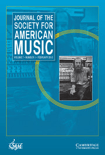
Journal of the Society for American Music
Scope & Guideline
Connecting Scholars Through the Harmony of American Music
Introduction
Aims and Scopes
- Cultural and Historical Analysis of American Music:
The journal explores the historical development of various American music genres, including classical, folk, jazz, and popular music, and how these genres reflect broader cultural and societal changes. - Interdisciplinary Approaches:
It encourages interdisciplinary research that integrates musicology with fields such as sociology, history, cultural studies, and gender studies, thereby enriching the understanding of music's role in American society. - Focus on Marginalized Voices:
There is a consistent emphasis on the music of marginalized communities, including women, people of color, and indigenous groups, highlighting their contributions to the American musical landscape. - Engagement with Contemporary Issues:
The journal addresses contemporary issues in music, including race, politics, and identity, reflecting on how these issues influence musical expression and reception. - Preservation and Archival Studies:
It also delves into the preservation of American music history, examining archival practices and the role of music in shaping collective memory.
Trending and Emerging
- Social Justice and Music:
There is a growing trend towards exploring the intersections of music with social justice movements, particularly those addressing racism, gender inequality, and LGBTQ+ rights, indicating a commitment to using music as a lens for social critique. - Indigenous and Colonial Music Studies:
Emerging themes focus on the music of indigenous peoples and the impact of colonialism on musical traditions, highlighting the need to address historical injustices and the resilience of indigenous cultures. - Technology and Music Production:
The influence of technology on music production and consumption is increasingly examined, particularly in relation to how digital platforms reshape musical experiences and community engagement. - Expanded Notions of Genre:
There is a trend towards examining hybrid genres and cross-cultural influences in American music, reflecting the complexities of identity and cultural exchange in contemporary society. - Sonic Studies and Aural Cultures:
Research in sonic studies is gaining traction, focusing on how sound shapes experiences and identities, and how listening practices inform cultural understanding.
Declining or Waning
- Traditional Classical Music Studies:
There has been a noticeable decrease in papers focused solely on traditional classical music analysis, as the journal shifts towards more contemporary and diverse musical expressions. - Commercial Music Industry Critique:
While the journal has published critiques of the music industry, there is a waning focus on purely commercial aspects, as the discourse increasingly integrates social and political contexts. - Historical Musicology without Contemporary Relevance:
Themes that do not connect historical musicological studies with contemporary issues or cultural relevance are appearing less frequently, as scholars seek to make their research pertinent to current societal debates.
Similar Journals
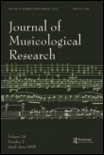
JOURNAL OF MUSICOLOGICAL RESEARCH
Fostering Scholarly Dialogue in Music StudiesJOURNAL OF MUSICOLOGICAL RESEARCH, published by Taylor & Francis Ltd, is an esteemed platform that delves into the field of musicology, contributing to the ongoing dialogue in music research and scholarship since its establishment in 1979. With an ISSN of 0141-1896 and an E-ISSN of 1547-7304, this journal serves as a vital resource for researchers, professionals, and students, offering insights into diverse musicological topics. Although currently categorized in Q4 in Music with Scopus rankings placing it at #110 out of 180 in the Arts and Humanities field, its commitment to excellence and broader discourses in music studies is evident. The journal does not have Open Access options, yet it provides accessible content through reputable academic channels, fostering scholarly exchanges within the community. It aims to publish high-quality research that advances understanding of musical practices and cultural implications, making it a critical resource for those passionate about music and its myriad influences.

REVUE DE MUSICOLOGIE
Connecting Scholars Through Musical InsightsREVUE DE MUSICOLOGIE is a prominent academic journal dedicated to the diverse field of musicology, published by EDITIONS TRANSATLANTIQUES in France. With an ISSN of 0035-1601, this journal has been a key platform for researchers and scholars since its inception, fostering scholarly discourse and advancing the understanding of music's cultural, theoretical, and historical dimensions. Although it currently holds a Q4 category in Music according to the 2023 quartiles and is ranked #140 in the Scopus Arts and Humanities Music category, REVUE DE MUSICOLOGIE continues to publish valuable insights that contribute to the global musicological landscape. The journal does not offer open access, adhering to standard subscription models. Its primary objective is to provide a rigorous forum for original research articles, reviews, and theoretical discussions, making it an essential resource for academics, professionals, and students in the field of musicology. Located at 50 RUE JOSEPH DE MAISTRE, 75018 PARIS, FRANCE, it promises to remain a vital part of music research through 2023 and beyond.
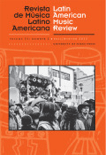
LATIN AMERICAN MUSIC REVIEW-REVISTA DE MUSICA LATINOAMERICANA
Unveiling the Cultural Tapestry of Latin American SoundsLATIN AMERICAN MUSIC REVIEW-REVISTA DE MUSICA LATINOAMERICANA stands as a prominent scholarly journal dedicated to the profound and diverse traditions of Latin American music. Published by University of Texas Press, this journal offers a platform for critical analysis, innovative research, and the dissemination of knowledge concerning the rich cultural heritage of Latin America. Although it currently does not provide open access options, the journal has made significant contributions to the field since its establishment, engaging a wide array of interdisciplinary perspectives. With coverage spanning from 2002 to 2009, the journal has been central to fostering scholarly dialogue and expanding the academic understanding of Latin American musicology, serving as an essential resource for researchers, professionals, and students alike. The journal is vital for those exploring the intersections of music, culture, and identity within the vibrant landscapes of Latin America.

ArtCultura-Revista de Historia Cultura e Arte
Advancing Scholarly Excellence in Cultural Studies.ArtCultura-Revista de História Cultura e Arte, published by Universidade Federal de Uberlândia, is a leading peer-reviewed journal in the fields of cultural, historical, and artistic studies. With its commitment to Open Access publishing since 2007, the journal provides an invaluable platform for researchers, professionals, and students to disseminate and access high-quality research without financial barriers. The journal's dedication to scholarly excellence is reflected in its robust editorial process and diverse range of articles that delve into the intricate connections between art and culture, promoting interdisciplinary dialogue and global perspectives. Situated in Brazil, ArtCultura plays a pivotal role in enhancing the visibility of Latin American contributions to these vital fields, thereby fostering academic collaboration and cultural understanding. We invite you to explore the rich tapestry of ideas and insights published in our journal, located at AV PARA, 1720 CAMPUS UMUARAMA, UBERLANDIA 38400-902, BRAZIL.

MUSIKFORSCHUNG
Fostering Critical Perspectives in MusicologyMUSIKFORSCHUNG is a distinguished journal in the field of music studies, published by NEUWERK-BUCH UND MUSIKALIENHANDLUNG in Germany. With its ISSN 0027-4801, the journal caters to scholars, practitioners, and students interested in the diverse realms of musicology. Although it is currently not an Open Access publication, MUSIKFORSCHUNG plays a vital role in the academic landscape by disseminating research and critical discourse on music from various historical and contemporary perspectives. The journal has established its worth in the academic community, being categorized in the Q4 quartile in Music for 2023 and holding a rank of #169 out of 180 in the Scopus Arts and Humanities Music category, placing it within the 6th percentile. With publication activities spanning from 2002 to 2013 and resuming in 2016 through to 2024, MUSIKFORSCHUNG continues to be a crucial resource for those dedicated to advancing music scholarship. Set in the cultural heart of Kassel, Germany, the journal invites contributions that foster an understanding of music's impact on society and culture.
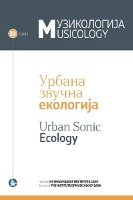
Muzikologija-Musicology
Transforming Music Research into Global DialogueMuzikologija-Musicology, published by the esteemed Serbian Academy of Sciences and Arts, Institute of Musicology (SASA), serves as a pivotal platform for scholarly discourse in the field of musicology. With its ISSN 1450-9814 and E-ISSN 2406-0976, this open-access journal has been committed to disseminating high-quality research since 2002, making significant contributions to the understanding and analysis of music in diverse cultural contexts. Located in Belgrade, Serbia, the journal proudly holds a Q2 ranking in the Music category for 2023, reflecting its high-impact contributions as evidenced by its Scopus rank of #136/180 and a percentile of 24th. Covering a wide array of topics within music, from ethnomusicology to music theory and history, it invites contributions that push the boundaries of music research. By fostering an open-access model, Muzikologija-Musicology aims to ensure that its findings are accessible to a global audience, thereby enriching the discourse and fostering collaboration in the musicology community.
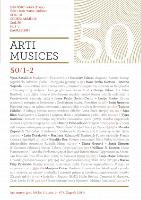
Arti Musices
Fostering Scholarly Exchange in the Heart of CroatiaArti Musices is a distinguished open-access journal published by the Croatian Musicological Society since 2007, dedicated to advancing the field of musicology and related arts and humanities disciplines. Operating from Zagreb, Croatia, this journal aims to provide a platform for scholarly communication, fostering international dialogue among researchers, musicologists, and practitioners. Although it has a current Scopus ranking in the bottom quartile within its category (Q4 in Music), it offers a unique perspective on the musicological landscape, particularly from a regional standpoint. Researchers seeking to contribute to or glean insights from this evolving field will find that Arti Musices serves an important role in disseminating innovative ideas and empirical research. The journal accepts submissions across a broad spectrum of music-related topics, inviting contributions that reflect the complexities and cultural contexts of music today.

Musicology Today
Fostering Dialogue Across Musical DisciplinesMusicology Today, published by SCIENDO, is a pivotal journal in the field of musicology, presenting a platform for scholars, researchers, and practitioners to disseminate their findings and engage with current trends in music research. With its ISSN 1734-1663 and E-ISSN 2353-5733, the journal aims to provide a comprehensive overview of various aspects of music, including theory, history, and ethnomusicology, fostering a multidisciplinary dialogue among its contributors. Located in Warsaw, Mazovia, Poland, this journal is not only committed to high academic standards but also to promoting open access to knowledge, thereby enhancing accessibility for a global audience. As it continues to bolster its reputation in the academic community, Musicology Today plays an essential role in shaping the future of music scholarship and invites the engagement of seasoned researchers and emerging voices alike.

Problemy Muzykalnoi Nauki-Music Scholarship
Illuminating the Path of Musical InquiryWelcome to Problemy Muzykalnoi Nauki-Music Scholarship, a leading journal in the field of music scholarship published by the esteemed Gnesin Russian Academy of Music. With an ISSN of 2782-358X and an E-ISSN of 2782-3598, this Open Access journal has been committed to the dissemination of high-quality research since 2009, making scholarly work accessible to a global audience. Covering diverse aspects of music theory, history, and its socio-cultural impacts, Problemy Muzykalnoi Nauki serves as an essential platform for scholars, educators, and practitioners in the arts and humanities, as well as in social sciences related to music education. While its Scopus coverage was discontinued in 2021, the journal remains influential, holding a rank of #48 in the Arts and Humanities category and a percentile of 67th, showcasing its relevance and rigor in the discipline. We invite researchers and students alike to explore the rich contributions made within these pages, fostering a deeper understanding and appreciation of music in contemporary society.

Resonancias
Unveiling the Rich Tapestry of Music Research.Resonancias is a distinguished open-access journal published by the Pontificia Universidad Católica de Chile, dedicated to advancing the field of music studies. With an ISSN of 0717-3474 and an E-ISSN of 0719-5702, this journal has been promoting scholarly discourse in music since its transition to open access in 2014. Resonancias serves as a critical platform for researchers, professionals, and students alike, enabling them to disseminate knowledge and explore innovative perspectives in musicology. With its current Q2 ranking in the field of music as of 2023, and a Scopus ranking of #108 out of 180, this journal exemplifies its commitment to quality and impact within the academic community, fostering an accessible database of music research from Chile and beyond. Situated at AVENIDA VICUNA MACKENNA 4860, MACUL, SANTIAGO, CHILE, Resonancias not only promotes original research but also includes critical reviews, interviews, and essays that contribute to the rich tapestry of musical knowledge.